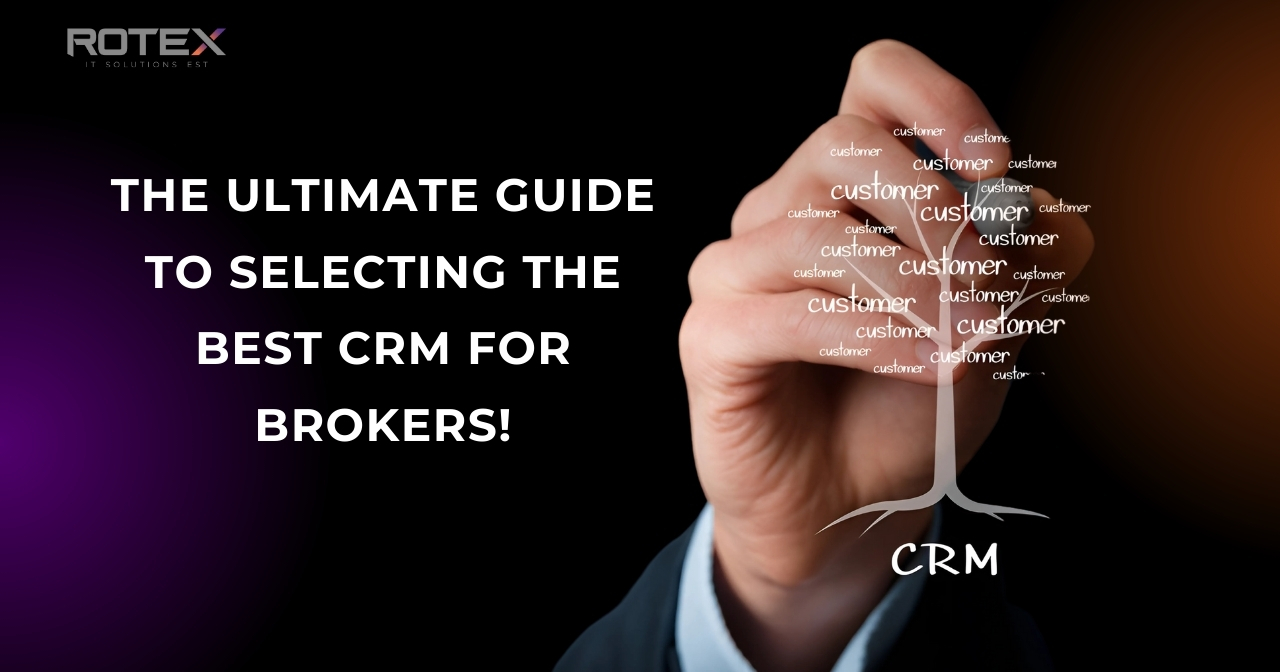The Ultimate Guide to Selecting the Best CRM for Brokers!
With so many CRM solutions on offer, brokers should take the time to carefully evaluate each one and the costs associated with using it—whether it’s setup fees, subscription costs, or additional features. A well-chosen CRM can streamline your brokerage’s operations, improve client relationships, and ultimately drive revenue growth.
In this guide, we’ll walk through the key considerations brokers should keep in mind when selecting a CRM, as well as highlight why Rotex IT Solutions is the ideal partner to help you integrate the perfect CRM solution.
1. Understand Your Needs
Before diving into CRM options, the first and most important step is to understand your unique business needs. If you don’t have a clear grasp of the challenges your brokerage faces, you may end up with a CRM that doesn’t align with your goals.
- Client Management: Does the CRM help manage and segment your clients based on factors such as trading behavior, communication style, and preferences?
- Market Insights: Does it provide data-driven insights that can help you anticipate trends, improve your services, and offer personalized experiences?
Client Retention: Does it help you foster long-term relationships through automated follow-ups, loyalty programs, and tailored marketing campaigns?
2. Take a Look at the Pricing
Pricing is a crucial factor when selecting a CRM for your brokerage, as it can impact your budget and the overall return on investment (ROI).
- Affordability: Brokers should prioritize CRMs that offer affordable pricing plans while providing high-value features like client management, lead tracking, communication tools, and more.
- Flexibility: Choose a CRM that offers flexible pricing models with options for scaling as your brokerage grows.
- Support Services: A reliable support team is essential. Make sure that the CRM provider offers 24/7 support, especially if you plan to serve clients in different time zones.
3. Take a Look at the Features
The features offered by a CRM can make or break its utility for your brokerage. Look for features that cater to the unique needs of your business and enhance your operational efficiency:
- Lead & Deal Management: The best CRMs allow brokers to track and prioritize leads effectively, while keeping them organized in the sales pipeline. This enables brokers to follow up on leads in a timely manner and close deals more efficiently.
- Centralized Client Database: A centralized database where all client contacts and communication history are stored can improve collaboration within your team and give you a comprehensive view of client needs.
- Automation: Features like automated email campaigns, task management, and follow-up reminders help brokers save time and reduce manual effort.
- Document Management: Top-tier CRMs come with seamless document management systems that allow you to store and organize important client files, such as contracts and agreements, in a secure environment.
CRM Integrations: Your CRM should work seamlessly with other tools in your tech stack—such as calendar applications, email marketing platforms, trade platforms, and accounting software—to create an interconnected ecosystem.
4. Get a Demo
Before committing to any CRM system, it’s essential to request a demo. A live demo will give you an opportunity to assess whether the software is easy to use and how well it fits into your existing business processes.
- Evaluate User Interface: A clean, intuitive UI makes it easier for your team to adopt the CRM without a steep learning curve.
- Test Key Features: Focus on whether the CRM integrates with other tools, manages tasks effectively, automates processes, and helps prioritize high-value deals.
- Assess Support Availability: Evaluate the quality of support offered by the CRM provider during the demo. Do they provide adequate training, troubleshooting, and ongoing assistance?
Additional Points to Consider
- Mobile Access: With many brokers and traders on the move, it’s important that your CRM is mobile-friendly. Ensure that the CRM offers mobile apps or responsive web versions so that your team can manage client relationships anywhere.
- Data Security & Compliance: Data security is crucial, especially in the financial services sector. Look for CRMs that meet industry standards for data encryption and privacy regulations such as GDPR or AML/KYC compliance.
- Customizability: Every brokerage has unique needs. Choose a CRM that allows for customization, whether it’s in terms of the sales pipeline, reporting features, or client segmentation.
Conclusion: How Rotex IT Solutions Can Help You Choose the Right CRM for Your Brokerage
- Selecting the right CRM for your brokerage can significantly enhance your client management, streamline your operations, and ultimately boost profitability. With Rotex IT Solutions, you gain access to tailored CRM solutions designed specifically for the needs of Forex brokers.
- At Rotex, we help you identify the right CRM features that match your business goals, offer seamless integrations, and ensure scalability as your brokerage grows. Our expert team will guide you through the selection process, ensuring you choose a CRM that not only meets your current needs but can evolve with your business.
- We provide comprehensive support and training to help you fully leverage the CRM system, ensuring you get the most out of your investment. With our expertise in CRM integrations, data security, and regulatory compliance, we ensure that your business operates smoothly and efficiently.
Let Rotex IT Solutions be your partner in creating a client-centric, efficient, and profitable brokerage. Contact us today to learn more about how our CRM solutions can help your business thrive in a competitive market.


